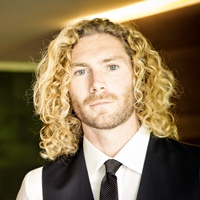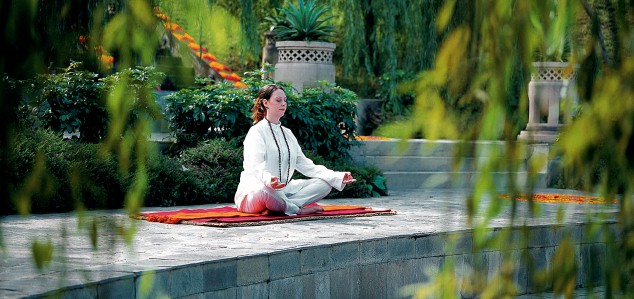Interview with an Ayurveda Health Practitioner
- Published: 13 February 2018 13 February 2018
 David Isaac
David Isaac
David Isaac is a certified Ayurveda health practitioner and meditation instructor. He was trained by some of the best and world renowned Ayurveda Drs, such as Deepak Chopak, Vasant Lad and David Simon. David has been practising Ayurveda and mediation for the past eight years and has attended over 80 seminars, courses and trainings. A southern California native, who moved to Spain in 2010 where he currently resides as the head teacher at A¡R Wellness, a company he founded. He is also author of two books, one about the Ayurveda diet principals and the second about the ideas that people hold onto that stop them from finding happiness.
Interview with an Ayurveda Health Practitioner
What inspired you to research and learn the art of meditation and Ayurveda?
When I was first exposed to meditation and Ayurveda, I was, to be honest, highly sceptical. But I was at a point in my life when anything had to be better, so I continued investigating. The more that I learnt, investigated and explored, the more that I found them personally helpful. The more time I dedicated to them, the happier and healthier I was, more so than I ever could have imagined previously. So I guess you could say it was the glimmer of hope that the purpose of life was happiness and not simply meaningless repetition and suffering.
How would you describe the ancient Ayurveda practise?
It is a complete practice aimed at balancing and maintaining one's complete health. By that I mean that it encompasses all aspects of one's being.
How is Ayurveda different from modern medicine?
The largest difference is in the very definition of what health actually is. Western/modern medicine describes health simply as the absence of a definable disease. Ayurveda defines health as the harmonic and vibrant functioning of mind, body and spirit. Ayurveda would also fundamentally differ from Western medicine in saying that life and existence are substantially more than bio-chemical interactions of physical matter.
What is a Dosha and what are the three principles used in Ayurveda?
A dosha is a mind-body constitution. The three constitutions are Vatta (which can be thought of as Potential and Movement, represented traditionally by Space and Air), Pitta (which can be thought of as Digestion and Transformation, represented traditionally by Fire and Water) and Kapha (which can be thought of as Stamina and Structure, traditionally represented as Water and Earth).

According to Ayurveda, it is known that each person has all three doshas, but that one can have dominating physiological and personality characteristics? How do they differ?
Rather than dominating, I would say that they have the constitutions in different ratios, as one Dosha is not "stronger" than another. Though closely related and interacting, mental constitutions differ from physical constitutions. Within each Dosha type are characteristics and tendencies. For example a person could have a more Pitta mind, and therefore be more inclined to point A to B type problem solving than the other two doshas, while have a Vatta body, being a lighter sleeper and eater and more prone to coldness than a Pitta or Kapha. Of course this is a very simple example of just a few tendencies exhibited by two doshas.
Why is it beneficial to know ones Dosha type?
I think in any case, not only concerning Doshas, the better one understands oneself, the more personal evolution and thus happiness is possible. This is because when we are made aware of a tendency that we have, we are more easily and quickly able to observe the said tendency we are consequently aware of it (and thus not simply acting in unconscious reactions) and therefore are able to either change or augment the behaviour or tendency because we begin to understand it simply through observation.
In the specific case of Doshas, it can be very helpful to know what varying experiences and stimuli will be either balancing or unbalancing, and how each Dosha will tend to react to certain situations. Of course this is true for the foods we eat, certain foods are more balancing and nourishing for certain Doshas types. However, Ayurveda identifies much more than simply food. This includes anything that can be experienced; sights, sounds, smells, environments, clothing, colours, practices, etc. More than that, once you begin to understand how you "work" you also begin to understand how others work as well. A good mechanic understands or can figure out how all similar engines fundamentally work, this is the same principle.
If someone tells you, "Hey, you're predominantly a Pitta- when you're very hungry, you're going to have the tendency to be a little more volatile, lookout for that," then you can be on the lookout for that. The same would be true for a Vatta- "When you don't eat, you're going to be more prone to have trouble focusing and feel extremely ungrounded." This is also true of emotions. For example, if each of the three Dosha types lost their keys, the Pitta would tend to say, "Where did you put my keys!" and feel anger. The Vatta would tend to say "Where did I put my keys? I am so stupid. I can't remember anything," and feel anxious or guilty. While the Kapha would tend to say, "Why can't I find my keys? I always put my keys in the same place," and feel lost and saddened.
What kind of treatments would one expect to have on an Ayurveda Holiday?
Firstly I would expect the holiday to include some sort of instruction on the principles of Ayurveda that can be taken home. This could be instruction on diet, doshas, meditation, etc. or a more in depth and inclusive instruction that combines the varying aspects of Ayurveda. It is a shame when one invests time and money to enjoy an Ayurveda holiday, and later is not able to implement or enjoy any of the wonderful wisdom and practices in their day-to-day lives. Ultimately I would expect the vacationer to leave the holiday with the ability to enhance and maintain their inherent health to a greater degree. This is really the most important, but also most forgotten part of Ayurveda.
That said, in my opinion an Ayurvedic holiday should include internal treatments, such as specialised foods and herbs, external treatments such as massage (Ayurvedic massages are amazing and can work wonders in relaxing the body and calming the mind. Shirodarah, Pizichili, and Vishesh, are three of my personal favourites.), and mental exercises, such as meditation instruction.
I would also expect from a true Ayurveda holiday to begin with some sort of consultation, and later whatever treatments are identified as best for the individual at that point in their life. I feel this is a much more effective and authentic experience than the individual simply choosing from a spa menu of massages with Sanskrit names.

What type of Ayurveda approaches do you use when treating a client?
Beginning each treatment by really listening to the story of the patient is an extremely useful Ayurvedic approach. In Ayurveda it is an absolute necessity to quietly listen to the patient and feel what they are feeling. In my experience, in vast majority of cases, the actual root causes of physical disturbances are unprocessed emotional disturbances. The average modern doctors visit lasts only 13-16 minutes, and only 9-12 minutes in the case of dermatologists and ophthalmologists. I don't feel that is sufficient time to do anything but solve a symptom of the problem, not actually help solve the cause of the problem.
Another Ayurvedic approach I find useful is to enter each treatment with the mindset that the best I can do is give the tools which allow the patient to uncover their health themselves. I think of it as giving an accurate map, but then they have to actually go where they want to go. The actual work is up to the patient. I sometimes joke with the patient, "no offense, but I hope I never see you again," because if I've done my job when the treatment is done, the patient should be able to take care of themselves. That is true freedom and health.
How can Ayurveda help with weight loss?
Ayurveda can be a tremendous aid in loosing weight. First, Ayurveda holds a unique view on digestion and our digestive power. Secondly, Ayurveda recognizes that everyone is different. What is balancing and beneficial for a Pitta can be disruptive and unbalancing for a Vatta. The same is true for all of the Doshas. Lastly, Ayurveda also holds a unique, but incredibly intuitive viewpoint on what we actually ingest and diet.
By first increasing our digestive power through removing obstacles and/or imbalances and augmenting this inherent power, then secondly eating properly for our personal constitution, and lastly eating Ayurvedically "complete" meals, we not only maintain or recuperate our naturally most healthy weight, but we can maintain and/or recuperate our inherent health.
How have you personally benefited from meditation and Ayurveda?
In short, they changed my life by allowing me to change my life and uncover my personal health and happiness. They were and have been the two tools that allowed me to "find what I was looking for," and upon uncovering it, I realized that what I uncovered is really what we are all trying to find.
Can Ayurveda be practised at home or does one have to seek guidance?
Ayurveda can definitely be practised at home. Ayurveda is a daily practice and pardoning the cliché, a way of life. As with any practice, a guide can be invaluable when beginning or during times of doubt, but any true guide must realize that the only thing of real value they can offer is to help an individual be self-sufficient.
What are your top tips for living a balanced and healthy life?
1) A quiet mind equals a truly happy person and a healthy body. Learn to meditate and cultivate a daily practice.
2) "Gnothi Seauton" - "Know yourself." Ultimately only you know what's best for you. Of course to really know yourself you need to really listen to yourself, and for that you need a quiet mind.
3) Don't obsess too much over "health." We spend so much time worrying about our health that we end up undermining exactly what we would like to achieve. Obsessing over calories and over-training to the point of injury are two examples. Stress is being shown more and more to be the underlying problem in a huge number of health problems. A light heart can go a long way.
View our Ayurveda wellness holidays
